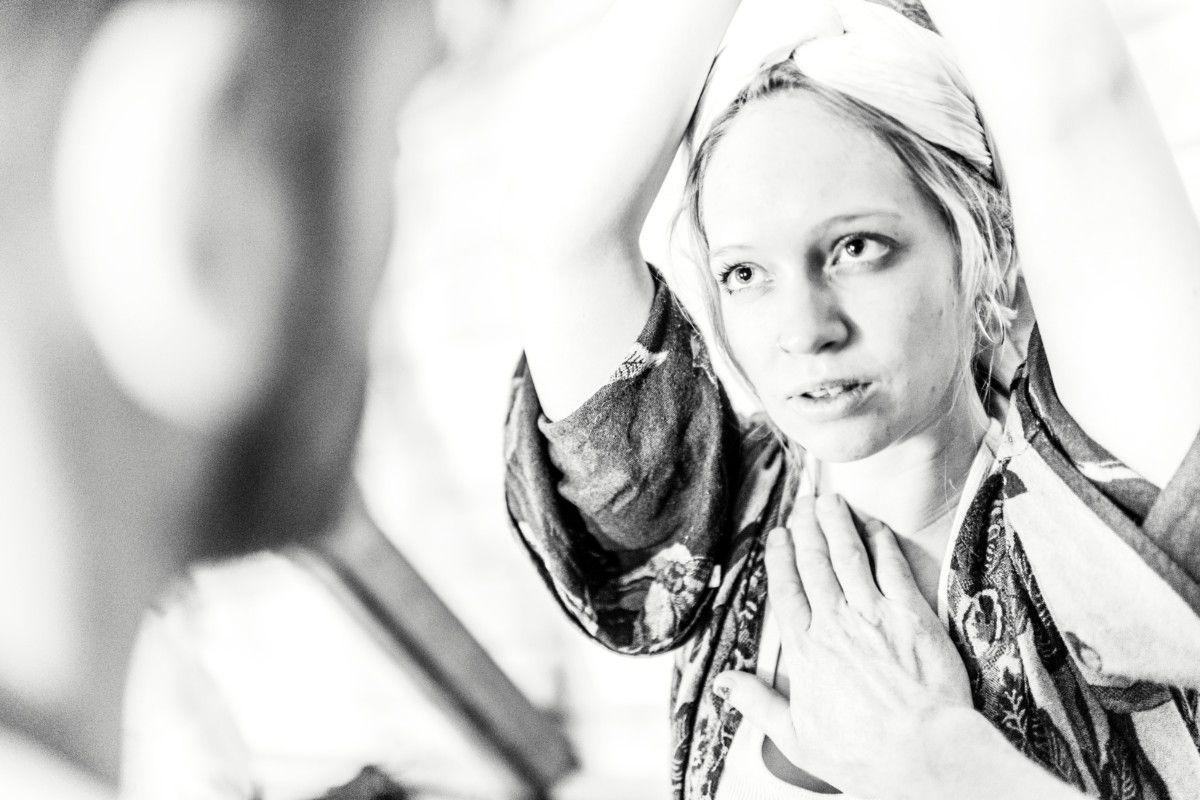ON POWER
with/ mit Andy Buru
Jan 3- 5// 2025//
Friday: 19 - 22// Saturday: 10 - 13, 15 - 18, 19 - 22 // Sunday 10 - 13, 15 - 18//
High Income 220€// Normal Income 200€// Low Income 180€//
20 euro discount for the people who attended the last workshop - if they buy a ticket within 30 days of the announcement!
Fees per person// singles and couples both welcome!!//
Registration: jana.felixruckert@gmx.de
- workshop in english -
ANDY BURU on POWER
Power, as a dominant, is vulnerable, as one has to expose their desire. The more deviant and taboo, the scarier it is, but still, both mainstream media and the sadomasochistic subculture overflow with caricatures of emotionless masters and mistresses hiding behind their cruelty. Instead, I think one should blossom in their raw self-expression. Power is an opportunity to explore new avenues of esoteric intimacy that are profoundly energetic and sensual. Far beyond plain and mundane fucking. Learning to wield and surrender to power consciously and consensually requires a great understanding of one’s boundaries and being safe and brave enough to reject anyone overstepping them. At the same time, one should be humble and have humour; anyone that has to assert their power with violence doesn’t own it.
Power is given to someone that deserves it because of their deviant creativity, rocksteady presence, and ability to create magical spaces. Discovering one’s very personal dominant persona is a journey which will significantly affect what kind of submissives they will attract. Luckily sadomasochism overflows with expressions of power, and there are several rituals to practice and embody. And learning the symbolism of fetish items is a priceless tool for this transformation. Being dominant is a paradoxical balance between holding space and being selfish. Holding space is learning how to create a safe container for oneself and others to play with power while being selfish is expressing desire.
But eventually, one realizes that the real key is to stop ‘the doing’ and simply be dominant and do as one pleases as if it is the most natural thing in the world. As dominance belongs to the masculine aspects of the esoteric erotic polarity, mastering it beyond gender becomes a way to simultaneously make a parody of existing power structures while reclaiming a more healthy relationship to masculinity. Playing with hierarchies in the ‘bedroom’ makes one more resilient to them in everyday life. And, of course, as in any play with polarity, there is also space to plunge into the other end – the submission and surrender – to learn, challenge, and worship. In old-school leather culture, no one would ever be allowed step into the boots of the dominant before wearing the collar of a slave. But I promise I’ll be both more flexible and gentle.
Below are some chapters from my book Rituals and Paradoxes that touches upon the theme Power.
One Take On Explaining Sadomasochism
How Do I Know If I Can Sacrifice Myself?
Exposing The Five Taboos Of Sadomasochism
Aftercare For The Vulnerable Dominant
Listening Is The First Step To Domination
50% SM
30% RITUAL
20% PARTY
0% ROPE
About Andy Buru:
Andy is a teacher of European and Japanese rope bondage, a medical massage therapist, a former organizational coach, a conscious kinkster and a student of theatre and tea. During his twenty years of BDSM, he has been an owned slave, a leather daddy, a hedonist, a purist, a magician, and a princess slut. His work aims to create magical rooms where people can rest, heal and grow. Andy loves that the world is allowed to be complicated because that makes every meeting unique. In between making a living from teaching, Andy spent most of his recent time writing the book ‘Rituals and Paradoxes: The Intimacy of Belonging in Sadomasochism and Esoteric Eroticism’ while studying the way of tea (chado) and flowers (kado) in the Japanese countryside. In the stillness between moments, life happens. Pause, witness. More: https://andyburu.se/home/
Other info that could be valuable:
Participating in these group processes is intimate and vulnerable. It is always a balancing act between freedom and responsibility—or selfishness and self-sacrifice—or safety and bravery. Finding oneself in either extreme can result in paralyzing fear or traumatizing chaos. Dancing on this slackline of mystery is the fundamental skill we practice together.
In a way, we are playing a game of
Jenga (see below),
where blocks balance in an intricate pattern—some are explicit rules, others are cultural norms, yet some are contradictory commandments.
Shapes and forms differ between cultures and communities. Eastern Europe is very different from Scandinavia, which is again different from Japan, Brazil, New York City, and Berlin, which also differ widely from each other. There is no exact blueprint but a continuously woven social web of interactions. Yet, if enough blocks are compromised, the play will collapse, and people may be hurt.
For many of us, these human dances of life are evident and almost second nature. However, sometimes things, people, and even worlds fall out of balance and must gently (or violently)—but always lovingly— be guided back. Below are seven almost universal freedoms and responsibilities to help you navigate these intimate and vulnerable spaces.
You can attend single or as a couple.
1. Settle the score before you leave
To play, one must be vulnerable. To be vulnerable, one must trust. To trust, one must know that someone will help ‘settle the score’ when hardship happens—that you are not alone. Preferably all the persons involved in whatever happened. Listening, assuming accountability, and saying I’m sorry often go a long way. Sometimes more is needed, but at least by being there, you enable this process. Leaving without settling the score means unfinished business and long-term damage to the social web we are trying to weave.
2. Don’t kiss and tell
Also, to be vulnerable, one must trust that what I share with you—in words and actions—remains safe with you. You can always talk about your own experiences, what happened to you, and what you felt. But leave everyone else involved anonymous by not mentioning their names and being thoughtful with what details you reveal about them. To gain the trust of others, demonstrate that you don’t kiss and tell when retelling your grandiose adventures of the past, just as you won’t kiss and tell in the future when you speak about the plays of today.
3. Don’t cockblock vulnerability
Similarly, to be vulnerable, one must trust that vulnerability is met with respect. When uncomfortable with others’ vulnerability, one often tries to make the vulnerable moments disappear by arguing for solutions, diverting attention to silly jokes, playing the devil’s advocate or playing the overprotective saviour. If someone can express their vulnerability in a storm of intense emotions, watch them in awe—you likely have something to learn from them. You enable others’ vulnerability by being vulnerable yourself; you cockblock vulnerability by playing the tough guy who doesn’t give a shit about anything.
4. Welcome all your emotions
When I demonstrate a particular exercise, there will be an emotional, non-verbal dialogue with my assistant. Don’t try to copy our experience. Instead, have your own journey. For me, a group process is perfect when someone is laughing, another is crying, a third is moaning, a fourth is confused, and so on. Know that all parts of you are welcome.
5. No fucking charity
You’ll pair up in exercises, join trios and quadruplets, and do group rituals. Even if you promised someone beforehand, and it doesn’t feel right in the moment, listen to the latter. Don’t do things out of charity. I take pride in trying to provide structures where it’s easy to opt out without creating an awkward situation for anyone.
6. Play inside the play, not outside
During our group processes, we have moments inside and outside of play. And we have rituals, signs, and language to move in and out. Some examples are entering a circle to indicate our willingness to play, placing our arms across the chest for a break, kneeling as a sign of submission, and establishing eye contact before body contact. The exact semantics may change, but you must learn to distinguish and respect when play is happening and not. Inside, you may play with power, be seduced by it, revel in it, or rebel against it. Outside play, avoid being a macho or mothering dominant, as well as a helpless submissive or a assholish trickster.
7. Don’t be a good student
I’m not your Guru Buru. If anything I say doesn’t make sense to you, don’t do it. You can always ask me for an alternative or simply do your own thing.
If this text seems complicated to you, you likely have a lot to learn from sharing intimate and vulnerable experiences in a group. Please notify the organizers if this is the case so I can keep an extra eye on you. If you have any questions or concerns, feel free to ask beforehand or during the group process itself. If you have a lot of previous experience or a more senior position in the group, I will have higher expectations of you to act as a role model. If you are new and insecure, you’ll likely have more leeway to learn our culture. If you are deemed unable or unwilling to comply, you will likely be asked to adjust your behaviour or leave the group process entirely.
Consent
Working with the eros as a group process often raises questions about sexuality, nakedness and consent, especially when using modalities from the space in between esoterism and sadomasochism. Most bluntly, people ask me if it’s a swinger’s party or an orgy that they are going to. Or if something that is often considered very private or even sacred to them will be kept safe in the presence of others.
How consent, boundaries and trauma awareness are dealt with differs substantially in different cultures and communities, so I’ll communicate in person how it works in each of the spaces I offer, as it also varies based on the topic and level. If you want an introduction to my somewhat paradoxical landscape of knowing what one wants, check out Chapter 2:
While We Fall in my book
Rituals and Paradoxes.
If you are looking for that introduction to consent, I recommend getting familiar with the work of Betty Martin and their School of Consent.
[1] Jenga is a kids’ game where players take turns removing one block at a time from a tower constructed of 54 blocks. Each block removed is then placed on top of the tower, creating a progressively more unstable structure. The game ends when the tower falls over.





